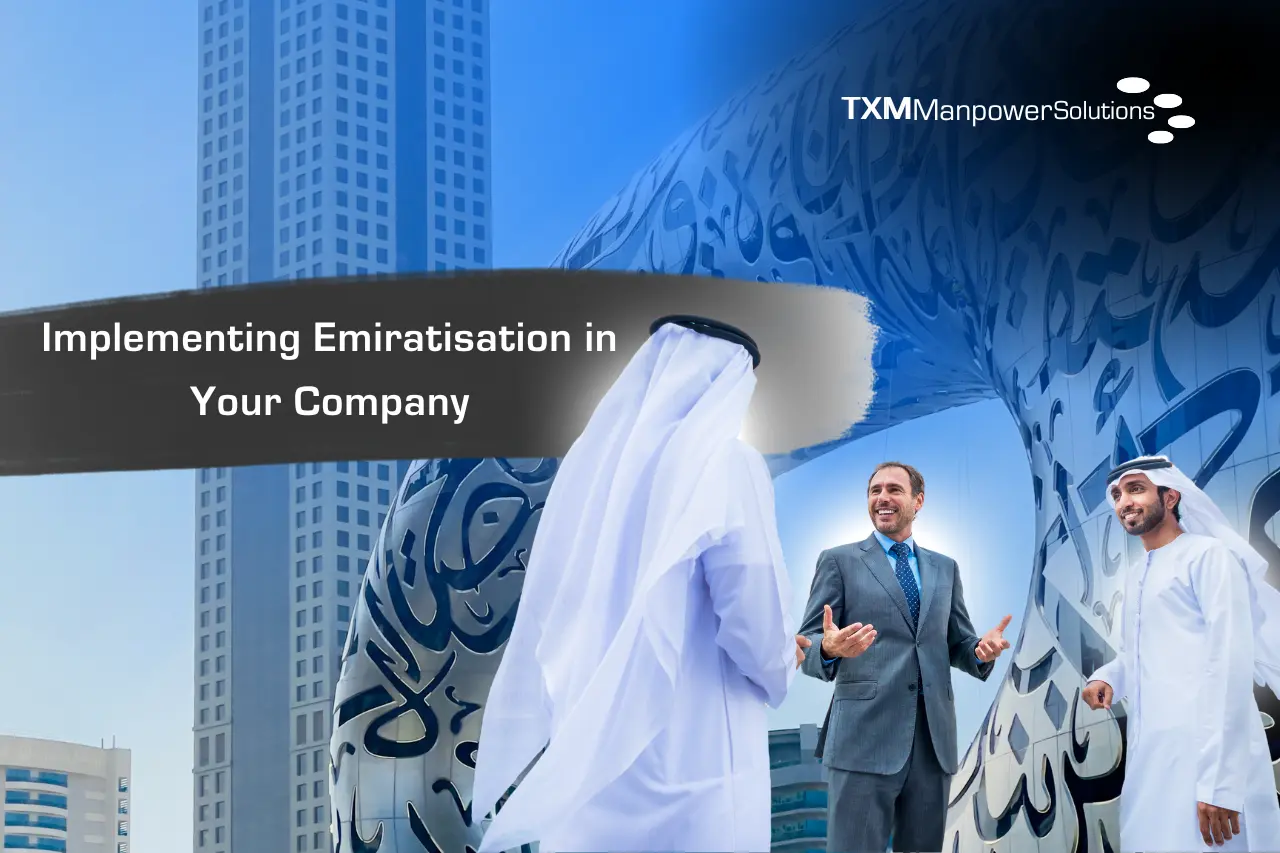Implementing Emiratisation in Your Company
The process of Implementing Emiratisation within your organization is a significant step that aligns with the UAE’s vision of economic diversification and national development. By prioritizing the integration of Emirati talent, companies can reduce reliance on expatriate workers while nurturing a highly skilled workforce reflective of the UAE’s long-term objectives. This strategic initiative also offers numerous advantages for businesses that embrace it, including operational improvements and stronger cultural alignment with the local market. Understanding the Value of Emiratisation Emiratization is a UAE government initiative designed to boost the employment of Emirati nationals across various sectors, especially the private sector. The goal is to promote local talent, enhance national skills, and reduce reliance on foreign labor. It’s more than just a compliance requirement, it’s a pathway to fostering innovation and sustainable growth. Companies that successfully integrate Emiratisation into their operations stand to benefit from a skilled workforce that understands the UAE market dynamics and can contribute to long-term stability. Key Benefits of Emiratisation Strategic Importance and Business Benefits Implementing Emiratisation goes beyond fulfilling government mandates, it’s a strategic decision that positions a company as a leader in local market development. Companies that focus on Emiratisation not only improve their corporate reputation but also gain fresh insights and perspectives from local employees. Emiratis often bring invaluable cultural and market knowledge that can drive innovation and tailor products or services to meet local demand. Moreover, relying on local talent helps create a more resilient workforce, reducing the turnover rates associated with expatriate labor and building a stronger connection to the national economy. Setting Clear Objectives for Emiratisation For businesses to reap the benefits of Emiratisation, it’s crucial to set clear, measurable objectives that align with both internal business needs and national policies. Companies must first assess where Emirati employees can add value, identifying roles that will help them grow while supporting business operations. By defining specific benchmarks, businesses can track their progress and ensure that Emiratisation efforts stay on course. This might include setting hiring quotas, integrating Emiratis into leadership programs, or offering mentorship to help them succeed in their roles. Aligning with National Policies and Government Expectations Staying informed about the latest Emiratisation regulations and quotas is essential for companies to remain compliant. The UAE government regularly updates its policies to encourage more private-sector participation in Emiratisation, and organizations must adjust their strategies accordingly. Businesses should regularly review policy updates, collaborate with government bodies, and integrate these changes into their Emiratisation frameworks. By aligning their internal processes with government objectives, companies can ensure compliance while also benefiting from any financial or operational incentives offered to those meeting Emiratisation targets. Building an Emiratisation Strategy A successful Emiratisation strategy goes beyond simply hiring Emiratis—it involves a long-term commitment to nurturing their growth within the organization. Companies should focus on creating a holistic approach that includes recruitment, development, and retention of Emirati talent. Establishing partnerships with local educational institutions is an excellent way to build a steady pipeline of Emirati professionals. Offering internships, apprenticeships, and tailored development programs ensures that Emiratis are well-prepared to enter and thrive in the private sector. Additionally, implementing leadership development programs helps pave the way for Emiratis to move into senior positions, ensuring their long-term contribution to the business. Recruiting and Attracting Emirati Talent Recruiting Emirati talent requires targeted efforts to appeal to the specific needs and aspirations of the local population. Companies can leverage UAE-focused job portals, participate in local career fairs, and highlight their commitment to Emiratisation through social media and public engagements. It’s essential to showcase career development opportunities and potential growth paths to attract top Emirati talent. Training and Development for Emirati Employees Once hired, Emirati employees need ongoing support to ensure their success within the company. Implementing structured training and development programs that focus on both technical and soft skills is vital. Tailoring these programs to meet the specific needs of Emirati employees helps address any skill gaps and positions them for long-term success. Mentorship programs are equally important, pairing Emirati employees with experienced mentors who can offer career guidance and support is an effective way to foster loyalty and professional growth. Additionally, continuous learning opportunities, such as leadership courses and management training, should be integrated into the company’s development strategy to ensure Emiratis are equipped for future leadership roles. Creating an Inclusive Work Environment For implementing Emiratisation to be effective, fostering an inclusive workplace where Emirati employees feel valued and respected is essential. Creating a culture of diversity and inclusion means educating all employees on cultural sensitivity and promoting understanding between Emiratis and expatriates. This can be achieved through cultural sensitivity workshops, open communication forums, and fostering an environment where Emirati employees are encouraged to contribute their perspectives. Encouraging inclusivity also means ensuring that Emiratis have the same opportunities for career progression as their expatriate counterparts, fostering a sense of belonging and engagement. Retention and Career Advancement for Emirati Talent To maximize the benefits of Implementing Emiratisation, companies must not only attract Emirati talent but also retain it. Offering competitive salaries, clear career advancement pathways, and continuous development opportunities are critical to maintaining a motivated Emirati workforce. Companies can further enhance retention by providing work-life balance initiatives, such as flexible working hours and family-friendly policies, which are highly valued by Emirati employees. Regular feedback and recognition of their contributions also help to foster a strong connection between the employees and the company, increasing retention rates. Performance Management and Monitoring Tracking and managing the performance of Emirati employees is crucial to ensuring that the objectives of implementing Emiratisation are met. Companies should set clear performance metrics and regularly evaluate the progress of their Emirati workforce. This can involve regular performance reviews, feedback sessions, and adjustments to development plans based on individual progress. By continuously monitoring performance, businesses can ensure that Emirati employees are growing in their roles and contributing meaningfully to the organization’s success. Leveraging Technology for Emiratisation Success Incorporating technology into the Implementing Emiratisation strategy can greatly enhance its effectiveness. HR technology platforms … Read more









